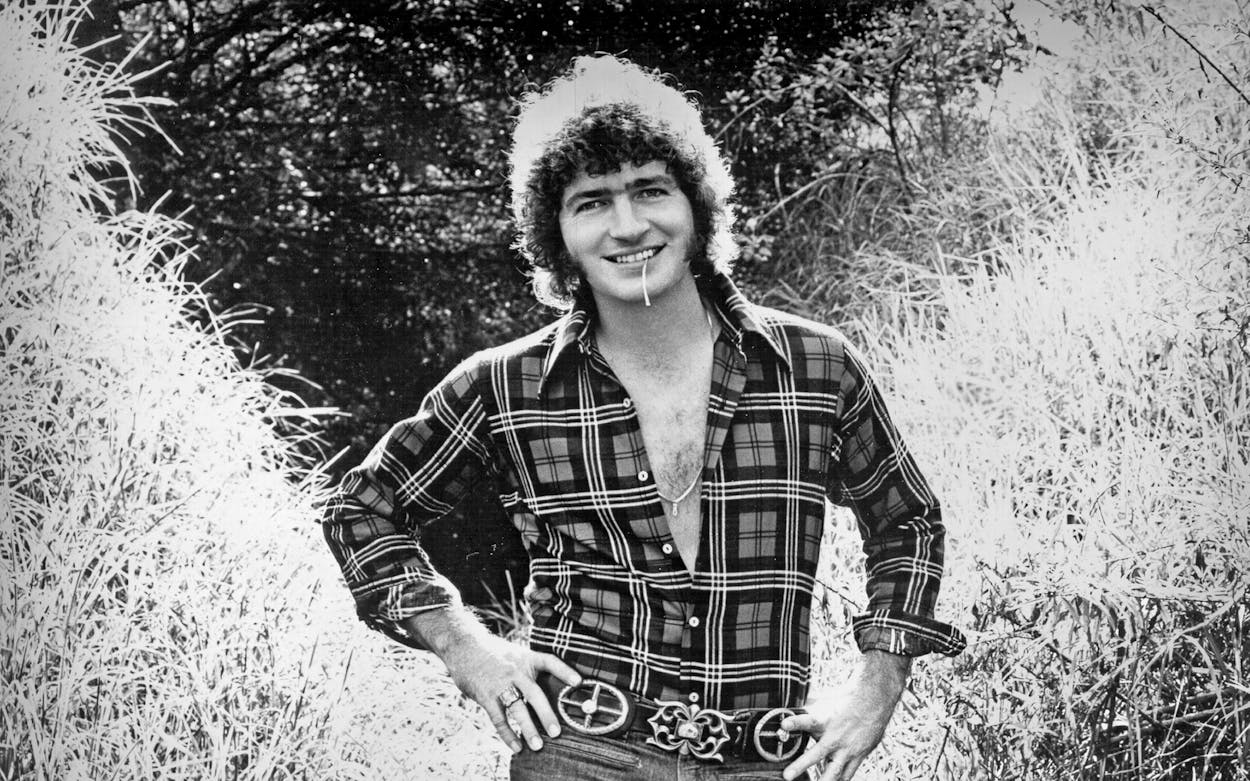The country singer-songwriter Mac Davis, who died in Nashville this week at age 78, spent most of his life in Tennessee and Los Angeles—but he always loved his hometown of Lubbock. Of the hundreds of songs he wrote over his sixty-year career, his favorite was “Texas in My Rearview Mirror.” Released in 1980, the song captures a feeling that many young Texans can still relate to—a restless desire to leave behind a sleepy hometown and move to a big coastal city: “I thought happiness was Lubbock, Texas, in my rearview mirror / My mama kept calling me home, but I just did not want to hear her.” These lyrics have led the song to be frequently misinterpreted as a putdown of Lubbock. But listen all the way to the end, and you’ll hear the narrator change his mind. Life in Hollywood has left him broke and lonely, and he’s decided to go home. “Now happiness was Lubbock, Texas, growing nearer and nearer,” he sings. “And when I die you can bury me in Lubbock, Texas, in my jeans.”
The song was his favorite, Davis once told author and artist Christopher J. Oglesby, because it felt so true to his life. “It’s what I am and who I am,” he said, “and besides, it has a good rhyme scheme and melody.”
Morris Mac Davis was born in Lubbock on January 21, 1942. Although Davis left the Hub City after graduating from Lubbock High, he never forgot his West Texas roots throughout a long and varied career as songwriter, singer, movie and Broadway actor, and television personality.
Music was an important presence in Davis’s life from the get-go. He started out singing in the church choir, and his father bought him a guitar when he was nine. As Davis recounted to Oglesby, “When I was a kid in Lubbock, I saw Buddy Holly driving down the street with a bunch of girls in his convertible. That was the exact moment I decided I wanted to be a singer.” Another defining moment for a thirteen-year-old Mac occurred on June 3, 1955, when he witnessed Elvis Presley shake the showroom of the local Pontiac dealership. Presley later recorded seven of Davis’s compositions, including the 1969 Top 10 hits “Don’t Cry Daddy” and “In the Ghetto.” The latter was a progressive, empathetic song about racial inequality, inspired by a childhood experience visiting a Black friend in a poor neighborhood. A remix of “A Little Less Conversation” also became a global smash for Elvis in 2002.
At the time he connected with Presley, Davis was already making a name for himself in Los Angeles as a songwriter. His songs have been recorded by the likes of Lou Rawls, Nancy Sinatra, Glen Campbell, Kenny Rogers, Bobby Goldsboro, Dolly Parton, B. J. Thomas, Ray Price, and Perry Como. And in recent years, he showed his range by collaborating with Swedish DJ Avicii and Bruno Mars.
After signing with Columbia Records in 1970 and then with Casablanca Records in 1979, Davis, as both a singer and a recording artist, enjoyed a series of pop-country crossover hits for the next decade. “Baby Don’t Get Hooked on Me” (1972) and “Stop and Smell the Roses” (1974) reached the Top 10 on Billboard’s Hot 100. “It’s Hard to Be Humble” (1980), “Texas in My Rear View Mirror” (1980), and “Hooked on Music” (1981) had similar success on Billboard’s country chart.
Davis was a ubiquitous presence on television, especially during the seventies. He had his own musical variety series, The Mac Davis Show, on NBC from 1974 to 1976, regularly sharing stories about growing up in the Lone Star State, and he hosted several television specials. In addition, he filled in for Johnny Carson on the Tonight Show and made appearances on The Muppet Show. On Broadway in 1993, Davis replaced Keith Carradine as Will Rogers in The Will Rogers Follies. His film career began auspiciously in North Dallas Forty (1979), a movie that has been described as the best gridiron film ever made and one of the best on any sport. He then starred in the poorly received comedy Cheaper to Keep Her (1981) and joined Jackie Gleason in The Sting II (1983).
Davis’s West Texas pedigree is on full display in North Dallas Forty. As Seth Maxwell, a Don Meredith–style quarterback, Davis took an active role in developing the character. “I even supplied my own lines,” he told a reporter for the New York Times. “I’d tell the director: ‘This is how a Texan would talk. You ask him a question, and he’ll answer with a question like, ‘Does a shark do it in the sea?’”
Davis’s hometown showed its appreciation as early as 1983, when he joined Buddy Holly and Waylon Jennings as the third inductee of the West Texas Walk of Fame. His other awards and accolades include membership in the Songwriters Hall of Fame (2006), Nashville Songwriters Hall of Fame (2000), Texas Country Music Hall of Fame (2004), Georgia Music Hall of Fame (1996), plus a star on the Hollywood Walk of Fame (1998). The Academy of Country Music named him Entertainer of the Year in 1974.
Over the years, when asked what Lubbock was like, Davis had a stock answer: “I would always say if I was going to have a flat tire without a spare, Lubbock is where I’d like to be.” In 2004, the city further honored Davis by renaming downtown Sixth Street as Mac Davis Lane (the only other Lubbock street named for a musician is Buddy Holly Avenue). Fittingly, then, the Davis family has announced that, after all those years in Los Angeles and Nashville, Mac will be coming home to be interred in Lubbock. And, yes, he will indeed be buried in a pair of his jeans.
- More About:
- Music
- Country Music
- Lubbock






